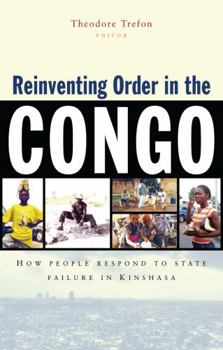< Back to Search Results
Reinventing Order in the Congo
Kinshasa is sub-Saharan Africa's second largest city. The seven million Congolese who live there have a rich reputation for the courageous and innovative ways in which they survive in a harsh urban environment. They have created new social institutions, practices, networks and ways of living to deal with the collapse of public provision and a malfunctioning political system. This book describes how ordinary people, in the absence of formal sector jobs, hustle for a modest living; the famous 'bargaining' system ordinary Kinois have developed; and how they access food, water supplies, health and education. The NGO-ization of service provision is analysed, as is the quite rare incidence of urban riots. The contributors also look at popular discourses, including street rumor, witchcraft, and attitudes to 'big men' such as musicians and preachers. This is urban sociology at its best - richly empirical, unjargonized, descriptive of the lives of ordinary people, and weaving into its analysis how they see and experience life.
Format:Paperback
Language:English
ISBN:1842774913
ISBN13:9781842774915
Release Date:December 2004
Publisher:Bloomsbury Publishing PLC
Length:234 Pages
Weight:0.72 lbs.
Dimensions:0.5" x 5.5" x 8.5"
Customer Reviews
2 ratings
Incredible--fascinating book
Published by Thriftbooks.com User , 17 years ago
This is a sociological study of the people living in Kinshasa, Zaire. You will enter another world of perception, such as the first world and second world of the witch-children, the child-soldiers, of cannibalism, the mire of sex and sorcery. It is broken down into individual essays by leading sociologists regarding the economy, survival on the streets, witchcraft, prostitution, matriarchal system ect... It is hair-raising and unbelievable at times. If you plan on going to the DRC, this book could save your life.
Exciting new approach to the study of failed states
Published by Thriftbooks.com User , 20 years ago
Since the term "failed state" was coined in 1992 by Helman and Ratner, many articles have been written about states that don't work. After September 11th, US, Canadian and European national security policies set out commitments to work in failed states on the grounds that lack of order and security in such states presented a threat to international security. The increased emphasis on peacebuilding which has resulted (and is most evident in Iraq and Afghanistan) has led to extensive discussion about how best to rebuild failed or collapsed states. But most books and articles have focused on the "big picture" - on lack of governance of the state, rather than on how the people of that state manage to live within the chaos that surrounds them. This book, which looks at the capital city of what most observers regard as a "collapsed" state, brings a welcome new perspective. As Margaret Wheatley showed us some years ago, even within organizational chaos, there is order, if you know how to look for it. In this case, the order can be found at the local level, within Kinshasa, the capital of the huge and resource-rich Democratic Republic of Congo. This book shows how the Kinois, as Kinshasa's residents call themselves, manage to create order within their own lives. For example, in a setting where many people eat only once every two days, starvation is not at the levels that would otherwise be expected, because people have developed their own social systems and structures for obtaining and distributing food. And as in many such states, women play a key role in this alternative system. Looking within failed states for order is an exciting new approach in this field, both in scholarly terms and in terms of offering new ideas for how peacebuilding can be designed to work effectively in failed states. The international community spends a great deal of money in trying to rebuild failing and failed states. This book offers a new perspective that will be valuable for both policy-makers and peacebuilders alike, in showing us peoples' great creativity and capacity to create order even when governance structures collapse around them.





